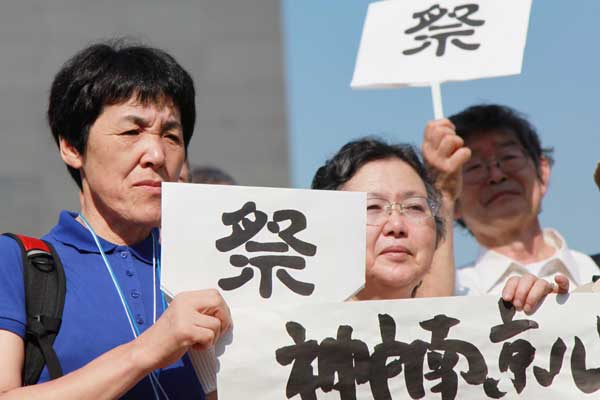No remorse as Abe marks surrender
 |
|
A group of Japanese peace activists pay their respects to victims of the Nanjing Massacre in the capital of Jiangsu province on Thursday, the 68th anniversary of Japan's surrender in World War II. At least 300,000 Chinese people were killed by Japanese soldiers when they took Nanjing, then China's capital, in December 1937, in a six-week rampage of looting, rape, torture and murder. The signs read: "In memory of the dead." [LIU JIANHUA / FOR CHINA DAILY] |
Japanese Prime Minister Shinzo Abe, whose hawkish views have raised concerns in the region, broke with two decades of tradition on Thursday by omitting any expression of remorse for Japan's past aggression in Asia on the 68th anniversary of its World War II surrender.
In a speech, he avoided words such as "profound remorse" and "sincere mourning" used by his predecessors to acknowledge the suffering caused by the Imperial Japanese Army as it stormed across East Asia.
Abe stayed away from the controversial Yasukuni Shrine, which honors Japan's war dead, including 14 Class A war criminals from World War II. But he sent a ceremonial gift to the shrine, bearing his name and title as head of the Liberal Democratic Party.
At a time when Japan is witnessing an unprecedented surge of nationalism that is downplaying its past militarism, three of Abe's cabinet members — Keiji Furuya, state minister in charge of the abduction issue, Yoshitaka Shindo, internal affairs and communications minister, and Tomomi Inada, administrative reform minister — made their pilgrimage to the shrine, together with 102 Diet members.
Abe joined Emperor Akihito at a ceremony at a Tokyo arena where they bowed before a backdrop of white and yellow chrysanthemums in respect for the war dead.
Abe has said he regrets not visiting Yasukuni on the anniversary during his first term in 2006-07.
Abe also failed to pledge not to fight a war in the future, as his predecessors did in previous speeches at the memorial ceremonies.
"Abe's failure to apologize to Japan's victimized neighbors has made it clear that his ruling Cabinet is the most nationalistic in recent years," said Yang Bojiang, deputy director of the Institute of Japanese Studies at the Chinese Academy of Social Sciences.
A recent poll showed that 56 percent of Japanese supported a visit by Abe to the Yasukuni.
Compared with his restrained attitude in his first term, Abe has shown a stronger will in pushing ahead with right-wing policies, which will lead to further friction with its neighbors, including China and South Korea, Yang warned.
Beijing strongly condemned the visits of Japanese Cabinet members to the Yasukuni Shrine on Thursday, with Vice-Foreign Minister Liu Zhenmin summoning the Japanese ambassador to China, Masato Kitera, to express the anger.
|
||||
Tetsuya Takahashi, a professor at Tokyo University's Graduate School of Arts and Sciences, said it is an improper historical perception that the war dead in Japan's aggressions should be worshipped as "gods" and commended for their deeds.
Liu Jiangyong, an expert on Japanese studies and the deputy dean of the Institute of Modern International Relations at Tsinghua University, said Abe's decision to make a ritual offering instead of visiting the shrine is his tactic for repairing ties with neighboring countries.
"However, by making an ornamental offering to the shrine, he has shown an ingrained nationalistic sentiment, which will never appease Asian neighbors," Liu warned.
South Korean Foreign Ministry spokesman Cho Tai-young said in a statement that leading Japanese politicians and Cabinet members "still turn a blind eye to history".
In his proposal on improving China-Japan relations, Shin Kawashima, director of the CSIS-Nikkei virtual think tank, said the two countries should have dialogues and seek common interests as a way to mend ties when they mark the 35th anniversary of the China-Japan Treaty on Peace and Friendship this year.
He hopes that Japanese Cabinet members treat Yasukuni visits with caution.
In a letter to Abe published in Japan Times, J. F. van Wagtendonk, president of the Foundation of Japanese Honorary Debts in The Hague, asked Abe to face Japan's war responsibility. "You cannot pass this responsibility to your and Japan's children."
Contact the writers at caihong@chinadaily.com.cn and zhangyunbi@chinadaily.com.cn
Registration Number: 130349




































